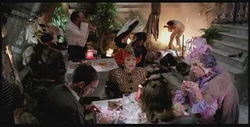Difference between revisions of "Brazil (film)"
(Added: start.) |
|||
| Line 15: | Line 15: | ||
'''Brazil''' is a film that depicts a dystopian future in which acts of "[[terrorism]]" are routinely carried out. | '''Brazil''' is a film that depicts a dystopian future in which acts of "[[terrorism]]" are routinely carried out. | ||
| + | ==Editorial Struggle== | ||
| + | The film studio, [[Universal]], re-cut the film to give it a happy ending, in which Sam gets the girl instead of descending into insanity. In order to get the original film released, Gilliam took out a full-page ad in ''[[Variety]]'', directed at the head of Universal, [[Sid Sheinberg]]. Gilliam corralled Los Angeles film critics to watch his version of the film in clandestine screenings, in breech of an embargo of showing the film. The movie won three L.A. Critics awards, and Universal decided to release the film.<ref name=mf/> | ||
| + | |||
==Comments from Terry Gilliam== | ==Comments from Terry Gilliam== | ||
| − | The author/producer, [[Terry Gilliam]] has denied that the film was a prediction of the modern world.<ref>http://mentalfloss.com/article/72844/13-fascinating-facts-about-brazil</ref> | + | The author/producer, [[Terry Gilliam]] has denied that the film was a prediction of the modern world.<ref name=mf>http://mentalfloss.com/article/72844/13-fascinating-facts-about-brazil</ref> |
{{SMWDocs}} | {{SMWDocs}} | ||
==References== | ==References== | ||
{{Reflist}} | {{Reflist}} | ||
Revision as of 12:32, 22 April 2017
(film) | |
|---|---|
 | |
| Type | file of unspecified type |
| Publication date | 22 February 1985 |
| Founded | 1985-02-22 |
| Author(s) | • Terry Gilliam • Tom Stoppard • Charles McKeown |
| Producer(s) | Arnon Milchan |
| Subjects | false flag attacks, “terrorism”, totalitarianism |
For the South American nation state, see Brazil
Brazil is a film that depicts a dystopian future in which acts of "terrorism" are routinely carried out.
Editorial Struggle
The film studio, Universal, re-cut the film to give it a happy ending, in which Sam gets the girl instead of descending into insanity. In order to get the original film released, Gilliam took out a full-page ad in Variety, directed at the head of Universal, Sid Sheinberg. Gilliam corralled Los Angeles film critics to watch his version of the film in clandestine screenings, in breech of an embargo of showing the film. The movie won three L.A. Critics awards, and Universal decided to release the film.[1]
Comments from Terry Gilliam
The author/producer, Terry Gilliam has denied that the film was a prediction of the modern world.[1]